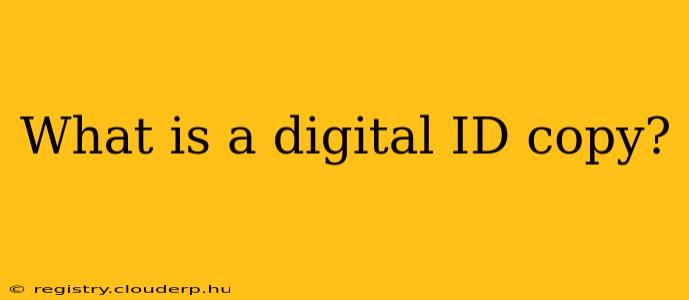A digital ID copy is a scan or photograph of an official identification document, stored and accessible in digital format. This could be anything from a driver's license or passport to a national identity card or even a company-issued employee badge. Crucially, it's a copy, meaning it's a representation of the original, not the original document itself. The quality and acceptance of a digital ID copy vary greatly depending on its intended use.
This seemingly simple concept has significant implications across many aspects of modern life, ranging from verifying identity online to accessing services and managing personal finances. Let's delve deeper into the nuances of digital ID copies and address some common questions.
What are the different types of digital ID copies?
Digital ID copies can take several forms, each with its own level of security and verification:
-
Simple Scan or Photo: This is the most basic form, often created using a smartphone or scanner. While convenient, this method is vulnerable to manipulation and lacks robust security features.
-
High-Resolution Scan with Metadata: A higher-quality scan, often preserving metadata such as timestamps and device information, offers better clarity and slightly increased security.
-
Enhanced Digital Copies with Security Features: Some systems incorporate advanced security features such as watermarks, tamper-evident seals, or blockchain technology to prevent forgery and ensure authenticity. These are commonly used for sensitive applications where identity verification is critical.
-
Secure Digital Identity Documents: In some countries, governments are issuing digital versions of ID documents that are encrypted and secured with cryptographic measures. These offer the highest level of security and authenticity.
How is a digital ID copy different from a physical ID?
The primary difference lies in the medium. A physical ID is a tangible document, while a digital ID copy is a digital representation. This distinction impacts several key aspects:
-
Portability: Digital copies are easily accessible and shareable, offering convenience. Physical IDs require physical possession.
-
Security: Physical IDs are generally more secure against unauthorized access and manipulation than basic digital copies. However, advanced digital IDs can surpass physical IDs in security.
-
Durability: Physical IDs can be damaged or lost, while digital copies can be backed up and easily recovered.
-
Verification: Verification of digital copies may require additional security measures compared to physical IDs, which are typically verified by visual inspection.
What are the uses of a digital ID copy?
Digital ID copies are used in a broad range of applications, including:
-
Online Account Verification: Many websites and services require digital ID copies to verify identity during registration or for account recovery.
-
Remote Identity Verification: Used in situations where in-person verification isn't feasible, such as online banking or telehealth appointments.
-
Proof of Identity for Legal or Administrative Purposes: Some situations may require providing a digital copy of an ID for official purposes, such as applying for a loan or submitting documentation to a government agency.
-
Access Control: Digital IDs can be integrated into systems for physical access control to buildings or other restricted areas.
Is it legal to use a digital ID copy?
The legality of using a digital ID copy depends largely on the context and specific laws in your jurisdiction. While many services accept digital copies for verification purposes, the use of digitally altered or forged IDs is illegal and can lead to severe consequences. It's always crucial to use legitimate and authentic copies and to adhere to any specific guidelines provided by the requesting entity.
What security measures should be taken when using a digital ID copy?
Protecting your digital ID copy is paramount. Consider these measures:
-
Secure Storage: Store your digital ID copy in password-protected files or encrypted storage solutions.
-
Limited Sharing: Only share your digital ID copy with trusted and legitimate entities.
-
Regular Updates: Regularly update your software and devices to mitigate security vulnerabilities.
-
Awareness of Phishing: Be aware of phishing scams that may attempt to obtain your digital ID copy under false pretenses.
In conclusion, a digital ID copy is a convenient and increasingly essential tool in the digital age. Understanding its various forms, uses, legal implications, and necessary security measures is crucial for navigating the complexities of online identity verification and ensuring both your security and compliance with the law.

